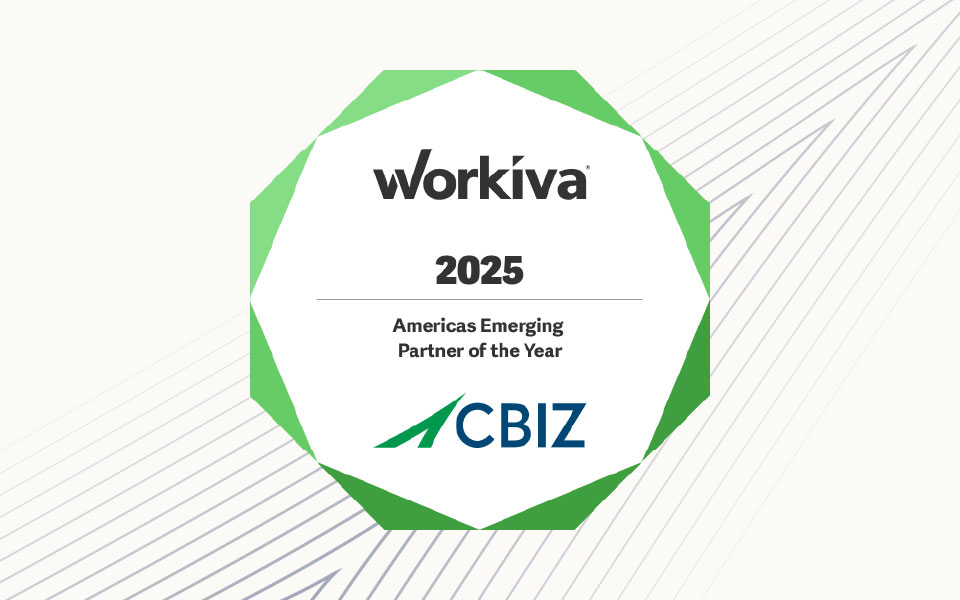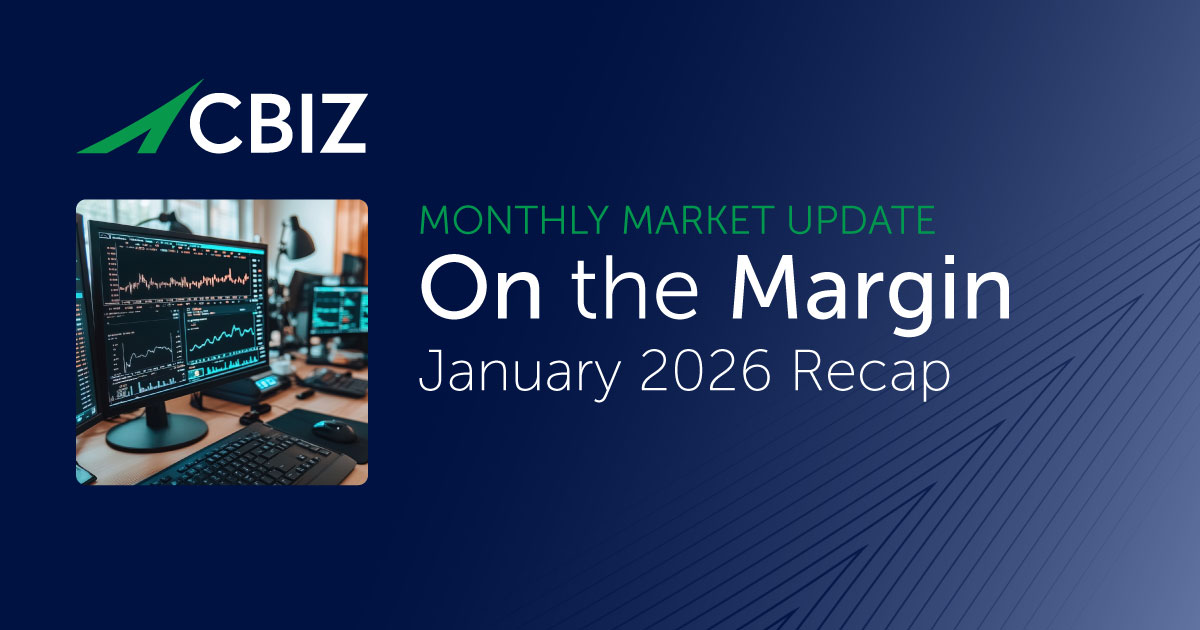Tariffs and retaliatory tariffs have far-reaching implications for business operations. As tariff-related costs work through supply chains, companies are grappling with how these changes affect inventory costs, impairment assessments, and financial disclosures.
For mid-market companies, which often lack the financial cushion or global supply chain flexibility of larger enterprises, the impact can be particularly acute. It’s critical to understand how evolving trade policies affect your financial statements and compliance with U.S. GAAP.
How Tariffs Affect Financial Statements
Tariffs raise the cost of goods imported into the United States. Even if your company doesn’t directly import goods, you may still be affected if you rely on domestic suppliers who use imported components. These indirect cost increases can affect financial reporting in the following key areas.
Going Concern Assumptions
Accounting standards require companies to assess whether they can continue operating as a “going concern” for at least 12 months after the date financial statements are issued. Tariffs or related trade policy changes may impact your going concern analysis due to rising costs, lost customers, or disrupted supply chains. You must include the impact of these events in your forecasts and analysis when determining whether it is probable that substantial doubt regarding operating as a going concern exists.
Inventory and Fixed Assets
The added cost of tariffs is typically included in the cost of inventory and fixed assets. For companies subject to high tariffs on key goods, this can lead to increased inventory costs that strain margins and pricing, impacting net realizable value. Companies should also consider the recoverability of these higher-cost fixed assets. If future cash flows don’t recover the carrying amounts, impairment charges may be necessary. This is particularly important for industries with tight profit margins or rapidly changing demand.
Revenue Recognition
Tariff impacts may trigger changes to customer contracts—either through renegotiated pricing, altered delivery schedules, or other modified terms. These adjustments can, in turn, affect how and when revenue is recognized under U.S. GAAP.
In some cases, projects previously expected to be profitable may shift into a loss position due to higher input costs. For contracts where revenue is recognized over time, this could result in the need to immediately recognize expected losses, which directly impacts earnings.
Goodwill and Intangible Asset Impairment
Tariff-related disruptions or declines in performance may serve as “impairment triggers” for intangible assets such as goodwill, trademarks, or customer lists. If business operations suffer — due to reduced sales, higher costs, or lost customers — companies may need to re-evaluate whether these assets are impaired.
Valuation and Market-Based Estimates
Many financial instruments and investment portfolios rely on fair value measurements based on market inputs or projected financial data. Tariffs can influence both of these factors. Market volatility, changing assumptions about future earnings or cash flows, and revised industry outlooks can all impact fair value calculations for equity investments or other financial assets.
Income Tax Implications
Changes in cost structures or international operations due to tariffs may alter your effective annual tax rate. Additionally, the realizability of deferred tax assets — such as those tied to NOLs or temporary differences — may be in question if future profitability is less certain. Adjustments to tax provision may be necessary.
Share-Based Compensation and Contingent Consideration
If your company uses performance-based compensation plans or has contingent payment (e.g., earnout) liabilities, reduced projections may necessitate a re-evaluation. For example:
You may need to re-measure the probability of achieving certain performance-based vesting conditions for expense recognition tied to share-based payment awards.
The fair value of contingent consideration in a business combination may change if tariffs impact earnings expectations.
Pension Plan Funding
Fluctuations in underlying asset values can materially affect pension obligations. For companies with defined benefit plans, a decline in the fair value of plan assets may result in underfunding and necessitate higher future contributions or increased disclosures.
Debt Covenant Compliance
If tariffs significantly hurt profitability, companies may find themselves close to violating debt covenants tied to financial ratios, liquidity, or other performance metrics, which could have financial presentation and disclosure impacts. This risk must be assessed carefully—especially for companies with limited cash reserves.
Credit Loss Allowances
Higher costs and economic uncertainty could affect your customers’ ability to pay on time, or at all. Companies may need to reassess their allowance for credit losses under ASC 326 (CECL model), particularly if they serve industries heavily affected by tariffs.
Disclosure Requirements
Under ASC 275, Risks and Uncertainties, companies must disclose significant estimates and assumptions that could materially affect financial results. If a change to a condition — such as a new tariff — is known or reasonably expected, it must be included in disclosures related to:
- Asset or liability carrying amount
- Gain or loss contingencies (ASC 450)
- Conditions or circumstances that may impact estimates
These disclosures should explain the nature of the uncertainty and, where possible, include an estimate or range of the potential impact or acknowledge that no reasonable estimate can be made.
While companies are not required to use specific language (e.g., “reasonably possible”), clarity and transparency are critical.
Conclusion
Tariffs may be beyond your control, but how your company prepares and responds to the accounting and reporting implications is not. Mid-market companies must take a proactive approach to assess risks, adjust accounting estimates, and maintain compliance with disclosure and reporting requirements. If your organization is uncertain about how tariffs could impact your financials, our accounting professionals can help you evaluate the potential effects and implement the appropriate accounting responses.
© Copyright CBIZ, Inc. All rights reserved. Use of the material contained herein without the express written consent of the firms is prohibited by law. This publication is distributed with the understanding that CBIZ is not rendering legal, accounting or other professional advice. The reader is advised to contact a tax professional prior to taking any action based upon this information. CBIZ assumes no liability whatsoever in connection with the use of this information and assumes no obligation to inform the reader of any changes in tax laws or other factors that could affect the information contained herein. Material contained in this publication is informational and promotional in nature and not intended to be specific financial, tax or consulting advice. Readers are advised to seek professional consultation regarding circumstances affecting their organization.
“CBIZ” is the brand name under which CBIZ CPAs P.C. and CBIZ, Inc. and its subsidiaries, including CBIZ Advisors, LLC, provide professional services. CBIZ CPAs P.C. and CBIZ, Inc. (and its subsidiaries) practice as an alternative practice structure in accordance with the AICPA Code of Professional Conduct and applicable law, regulations, and professional standards. CBIZ CPAs P.C. is a licensed independent CPA firm that provides attest services to its clients. CBIZ, Inc. and its subsidiary entities provide tax, advisory, and consulting services to their clients. CBIZ, Inc. and its subsidiary entities are not licensed CPA firms and, therefore, cannot provide attest services.















